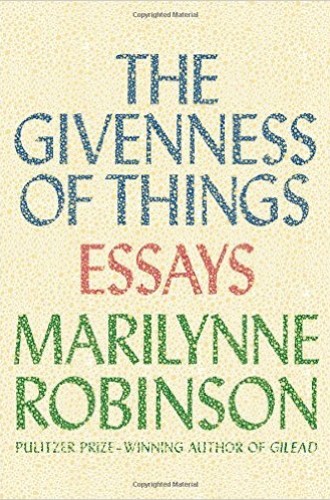Haunting particularities
In a conversation recorded in Iowa late last year, President Obama asked his favorite novelist, Marilynne Robinson, why she decided to write her newest book of essays.
“Well,” she said, “the essays are actually lectures. I give lectures at a fair rate, and then when I’ve given enough of them to make a book, I make a book.”
“So you just kind of mash them all together?” the president asked.
“I do. That’s what I do.”
This is helpful to keep in mind. Robinson’s essays sometimes have a certain edge that, viva voce, would be gentled by a disarming chuckle or an inflection indicating that she speaks with all due respect.
I am, as is surely obvious, rising to defend Robinson’s newest volume against criticism already leveled against it. And I am not an impartial judge. I reserve my copies of her books the moment the possibility to do so exists. I buy tickets to hear her speak. I search iTunes for podcasts of her lectures. I am, in short, a great admirer of her work, and in some ways an evangelist for it. I would like for her to be read more widely.
It is precisely because Robinson has such richness of thought to offer Christians—and others—that I would like her nonfiction in general, and this collection in particular, to be more accessible. Many of her readers, including me, must exert a measure of diligence and determination to construe her meaning when she speaks in her own voice, instead of that of, say, the fictional John Ames, whose meaning is usually not so hard to discern.
Read our latest issue or browse back issues.
Further, in some of the essays Robinson’s failure to name names and cite pages make her appear to be shadowboxing. In “Humanism,” an eloquent and timely defense of the humanities, Robinson takes aim at unnamed “neuroscientists” whose unstated goals include the insistence “that there is no soul.” This critique is reminiscent of Robinson’s takedown of Steven Pinker in her Yale Terry Lectures in 2009, later published as Absence of Mind. Similarly, in “Metaphysics,” she claims that “Christians struggle to articulate a proper relationship with the Old Testament.” There are truths in her suggestions: that many neuroscientists are overweening and reductionistic in relation to the complexity of lived human experience, and that many Christians read the Old Testament badly if at all. But these truths are diminished by Robinson’s lack of examples.
For all of this, The Givenness of Things is a very fine gathering of many of the arguments and ideas for which Robinson is justly admired. She excels at explaining and defending oft-neglected or misread texts and traditions about which thinking Christians may feel ashamed or apologetic. Robinson is occasionally prickly (for example, pastors may not enjoy reading her opinion on the state of most mainline seminaries and preachers). Yet the reader comes away from this volume with a renewed sense that there is more beauty and goodness in Christianity, in the God of the Hebrew Bible, and in human beings themselves than most of us are in the habit of celebrating.
Several essays explore the surprisingly lovely tradition known as Wycliffism or Lollardy. In this popular movement, traveling “poor priests,” tradesmen, and peasants preached a Christian faith that only seemed simple. They carried with them small (and therefore easily concealed) handwritten volumes containing a Middle English translation of the Bible. “Complex as the history is, the Bible may fairly be said to have entered English as a subversive document,” Robinson writes. She reads John Wycliffe’s impulse to give the Bible to the people as a profoundly democratic act. Wycliffe and other reformers were “devoted to the work of removing the barrier from the learned and unlearned by making Christianity fully intelligible in the common languages.”
She demonstrates that William Langland’s allegory Piers the Ploughman, also deeply entwined with Lollardy, contains a vision of inclusivity that might cause certain Christian institutions today to squirm. Robinson quotes the medieval poet: “Faith alone is sufficient to save the ignorant. And that being so, many Jews and Saracens may be saved, perhaps before we are.” Again she quotes: “[A]n honest man that lives by the law that he knows, believing there is none better (for if he knew of a better he would accept it)—a man who has never treated anyone unjustly, and who dies in the same spirit—surely the God of truth would not reject such honesty as this.”
Robinson—who wrote her Ph.D. dissertation on Shakespeare’s history plays—suggests that Lollard thinking, characterized by the conviction that Christ “always pursues us in a poor man’s apparel,” had enough of an influence on English thought that it shaped Shakespeare. She sees in his plays a treatment of grace and servanthood that carries the fragrance of Lollardy and therefore of Christ.
Robinson unstintingly admires John Calvin and Reformation thought generally. She locates within the stream of Reformation-influenced thought “the most persistent and fruitful tradition of American literature from Emily Dickinson to Wallace Stevens,” which she elaborates as “the meditation on the given, the inexhaustible ordinary.” But her reverence returns always to the God of the ancient Hebrews. Reverence for the human being, for the ordinary, for the givenness of things, is “by no means originally or exclusively or consistently Protestant or Christian. It has its roots in Renaissance humanism, in classical tradition, and before either of them, in the ancient Hebrew’s assertion that a human being is an image of God.”
This assertion—that a human being is an image of God and therefore deserves the greatest respect—is the golden thread woven through this volume, as through all of Robinson’s works. “The one great corrective to our tendency toward depredation would be a recognition of our abiding sacredness, since we are both, and often simultaneously, victim and villain,” she writes in “Son of Adam, Son of Man.”
Recognizing Christianity as less an identity than a metaphysic, she insists, would stay our tendency toward fearfulness; toward contracting what we are and can be to the tedium of economic and practical necessity; toward contempt for other people; even toward the tendency to violence and insistence on the “right” to bear arms. “We would not now have a sizable part of our own population walking around prepared to engage in homicidal violence if they truly believed that the young man in the hoodie was an image of God.”
Alas, my favorite Robinson lines, from her lecture at the Key West Literary Seminar, were edited out of the printed version of the final essay, titled “Realism.” This is a pity, because they so tidily summarize what I find best in Robinson’s writing, that generous, open spirit that breathes life into her novels: “Contempt imposes; grace discovers. Contempt generalizes; grace is charmed by haunting particularities. Contempt entraps; grace frees.”
John Ames tells his son that God loves each of us as an only child. To be charmed by haunting particularities, to meet others as God meets us—prickly and imprecise and difficult though we may sometimes be—is a kind of grace. Marilynne Robinson is a singular thinker whose particularity haunts and whose writings provoke improbable curiosity and surprising avenues for grace.






